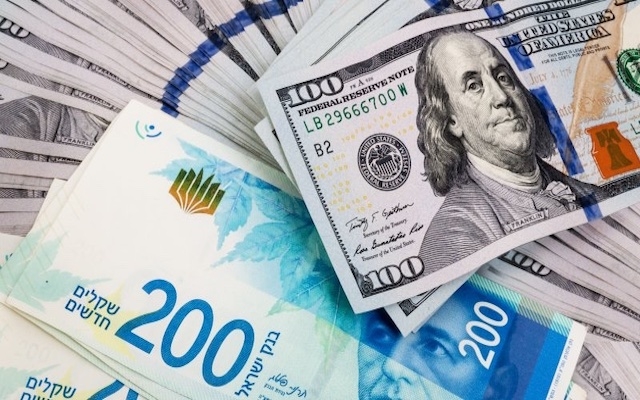In a recent interview with Israel Hayom, Ronan Menachem, Chief Market Economist at Mizrachi Tefahot, detailed the intricate factors contributing to the weakening of the Israeli shekel against the U.S. dollar. Menachem's comments come in the wake of an unparalleled development—on Thursday, the dollar surged 1% against the shekel to reach NIS 3.84, a peak not witnessed since 2016.
The catalyst for this financial activity appears to be rooted in Knesset Speaker Amir Ohana's latest statement to the media. Amid a climate of legal wrangling and the mounting anticipation of High Court hearings, fears of a constitutional crisis have intensified. "The deterioration of legal discourse, urgent anticipation for High Court rulings, and genuine concerns about a constitutional crisis have contributed to the continued ascent of the dollar against the shekel," Menachem explained.
#Israhelli Shekel reached an all-time-high loss of value against the US dollar since 2016. pic.twitter.com/aTd521UYeT
— Divine Brotherhood 🇮🇷 (@mhrezaa2cen) September 7, 2023
Notably, the dollar's strength is not solely an Israel-specific phenomenon. The currency is experiencing a global resurgence following a series of declines on Wall Street. However, its rate of growth vis-a-vis the shekel outpaces its global performance, adding another layer of complexity to Israel's economic landscape.
In the short term, Menachem anticipates that the shekel's weakening may persist, cautioning that volatility is a critical factor that should not be overlooked. "Volatility in all directions must be accounted for," he advised. The shekel has seen a 5.2% decrease against the dollar in the past month alone. This trajectory is further exacerbated by the Bank of Israel's warnings about rising inflationary pressures. These trends point to the likelihood that the Central Bank might advance its schedule for an interest rate hike—potentially even ahead of next month's planned date. The option of selling dollars to stabilize the shekel is also on the table, Menachem noted.
What happens to the basket of currencies tied to the US dollar when the dollar falls?
— Mighty Mouse (@THEMightlyMouse) September 5, 2023
“The U.S. dollar is roughly 8% stronger than the Israeli shekel year-to-date.”
“currency intervention will only be necessary in the event of market failures” https://t.co/dB3tXrrW4L
The move away from the 3.80 mark is particularly significant in gauging market sentiment. "Testing a ratio of 3.90 is not outside the realm of possibility, given the current high volatility," Menachem added. Numerous factors could sustain this trend in the near future, including the escalating legal disputes, increasing security concerns, Wall Street declines, and a sharp contraction in local high-tech investments. "These elements are likely to persist in the near term, putting further downward pressure on the shekel and drawing the Bank of Israel into action," Menachem concluded.
In summary, the Israeli economy finds itself at a crossroads, dictated by both domestic and international events. The volatility of the shekel against the dollar poses significant implications for policymakers and could necessitate swift intervention from the Bank of Israel. As Israel navigates these turbulent financial waters, the country will need to balance domestic concerns with global economic indicators carefully.


